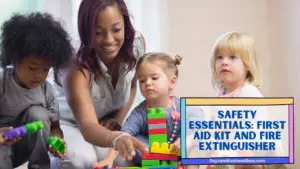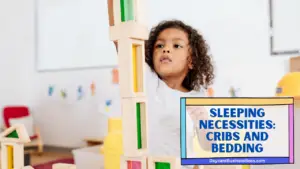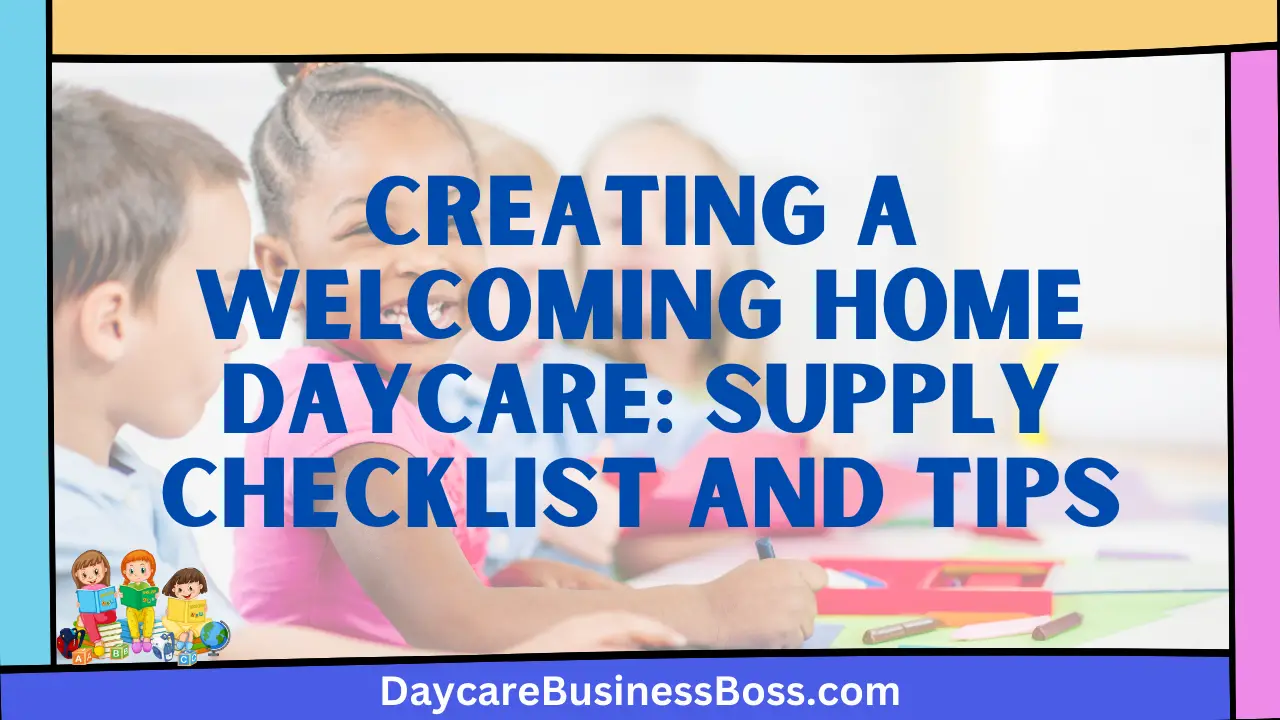Setting up a home daycare is a commitment to fostering young minds and creating a safe refuge for children to learn, grow, and explore. As you prepare to embark on this exciting journey, remember that the home daycare supply checklist is essential to the growth of your daycare.
The most useful approach to setting up a home daycare involves gathering safety essentials (first aid kit, fire extinguisher), educational materials (books, toys), hygiene supplies (wipes, hand sanitizer), sleeping necessities (cribs, bedding), and feeding items (high chairs, bottles).
In this article, we’ll go over the components of the home daycare supply checklist, emphasizing their importance and providing insights into why they’re so important for providing a well-rounded and enriching daycare experience. So, let’s look at the components that work together to create a thriving and nurturing home daycare.
Safety Essentials: First Aid Kit and Fire Extinguisher

When it comes to establishing a home daycare, one key principle must never be compromised: safety. The safety of the youngsters entrusted to your care should take first. In this sense, it is critical to create an environment that not only promotes learning and play but also protects their health and safety.
A well-stocked and easily accessible first aid kit is an essential component of a safe home daycare. Because children are inherently interested and energetic, small cuts, scratches, and bruises are usually unavoidable. As a result, having a well-stocked first aid kit on hand can be useful. This kit should include items like bandages ranging from adhesive strips to bigger dressings, antiseptic wipes to clean wounds, adhesive tape to secure bandages, and other medical supplies that may be required in the event of an incident. This not only ensures that minor errors are addressed quickly, but it also gives parents confidence that their children are being looked for responsibly and proactively.
In addition to the first aid pack, the existence of a fire extinguisher is an essential safety measure. Fires can start from a variety of sources, some of which are unexpected. You are taking a proactive attitude in limiting potential fire threats and safeguarding the safety of both the children in your care and the physical premises by keeping a fire extinguisher on hand. This vital piece of equipment can be a lifesaver in a crisis and can help to contain a fire before it reaches a dangerous level.
The importance of these safety precautions cannot be emphasized. The job of caring for children necessitates steadfast attention to their safety, and by following these safety principles, you are establishing an environment in which parents can feel confident that their children are in good hands. Your dedication to safety not only displays your professionalism but also serves as a model for the children you care for, teaching them the value of foresight and caution.
Read more about: How to Start a Daycare Center in Louisiana
Educational Materials: Books and Toys
It is critical to create a home childcare atmosphere that develops both the minds and hearts of young learners. The core of this work is the creation of an environment that is both stimulating and informative. Caregivers can set the stage for children to embark on a voyage of discovery and growth by filling the area with a carefully curated selection of age-appropriate resources.
Age-appropriate books are among the most effective tools in this instructional armory. Books are portals into a world of knowledge and imagination. Caregivers may establish a love of reading in children from an early age, influencing their intellectual development for years to come. The power of storytelling can take young minds to various places, encouraging creativity and cultivating curiosity. Books set the framework for developing vocabulary, comprehension, and a lifetime love of learning, from vibrant picture books that engage their senses to simple stories that spark their knowledge of the language.
Educational toys are another important aspect of a dynamic home childcare setting. These toys are intended to engage young minds in active investigation and discovery, rather than just provide entertainment. Caregivers can offer children tools that not only catch their attention but also stimulate cognitive, emotional, and social growth by picking toys that correspond to developmental milestones. From problem-solving puzzles to building blocks that improve spatial awareness, these toys provide an interactive and engaging environment where learning feels like play.
Educational toys create a setting for social relationships. Children benefit from shared play experiences in developing crucial social skills such as cooperation, communication, and empathy. Children learn to negotiate, share, and understand diverse points of view through collaborative activities, laying the groundwork for good interpersonal interactions in the future.
Hygiene Supplies: Wipes and Hand Sanitizer
Maintaining perfect sanitary standards is an unrelenting commitment that cannot be compromised in the sphere of a home daycare. The health and well-being of the young charges in your care are of the utmost importance, and this responsibility extends to establishing an environment that is both caring and meticulously clean. In this endeavor, hygiene items emerge as critical tools for protecting children’s health and creating a safe refuge.
Wipes and hand sanitizers, for example, play an important part in the ongoing war against the spread of viruses and illnesses among youngsters. Childhood’s natural curiosity and proclivity for exploration frequently lead to intimate touch with various surfaces, both indoors and out. Because these surfaces can house unseen germs, having wipes on hand helps as a first line of defense. Caregivers can verify that surfaces are clean and sanitized with a single swipe, reducing the risk of infections and illnesses. This vigilance in maintaining the surroundings germ-free adds substantially to the children’s well-being.
Fostering appropriate hand hygiene practices emerges as a valuable technique in the broader context of hygiene. Caregivers can teach the habit of regular handwashing in children at an early age by providing consistent reminders and demonstrations. This simple yet effective approach extends beyond immediate cleanliness; it instills a habit in the children that will serve them far into adulthood. The children learn the necessity of keeping their hands clean to prevent the spread of infections, which extends beyond the bounds of the daycare and becomes a vital part of their daily life.
Having a clean atmosphere benefits more than simply the children. It also provides parents with peace of mind when they put their children in your care. Knowing that their children are in an environment that values hygiene instills trust and reassurance.
Sleeping Necessities: Cribs and Bedding

A fundamental role is to create a childcare setting that promotes the comfort and safety of its young residents. Within this context, the establishment of a comfortable sleeping environment appears as a critical component. Understanding the importance of adequate sleep in children’s growth and development, caregivers must methodically create an atmosphere that not only promotes rest but also ensures the children in their care’s well-being.
Sleep is essential for a child’s physical and mental development. During these moments of rest, the body engages in critical growth activities such as cell repair and the release of growth hormones. Sleep is essential for cognitive functions, memory consolidation, and emotional regulation. Recognizing these advantages, caregivers are tasked with creating an environment that promotes healthy sleeping patterns and keeps children well-rested.
The provision of cribs with adequate bedding is important to this attempt. Cribs are resting places, and the bedding in them must be carefully chosen to give a sense of security and tranquility. Soft, soft bedding encourages youngsters to take pleasant naps, helping them to replenish both physically and psychologically. However, in this endeavor, safety comes first. It is not negotiable to adhere to stringent safety regulations while selecting cribs and bedding materials. Ensuring that cribs fulfill prescribed safety criteria reduces the likelihood of accidents, such as entrapment or falls, and thereby protects the children’s health.
Bedding materials should be chosen with safety and comfort in mind. Soft bedding goods such as blankets, cushions, and plush animals should be used with caution, especially with infants. These products can cause asphyxia. Instead, using snug-fitting, breathable crib sheets, and sleep sacks can provide the necessary warmth and comfort without jeopardizing safety.
Caregivers create an environment that assures not just restful sleep but also peace of mind for parents by following safety requirements and selecting proper bedding materials. Parents can leave their children with confidence in a daycare where sleep is treated with the respect and dedication it deserves.
Read more about: Children First: The All-Inclusive Family Daycare Safety Checklist
Feeding Items: High Chairs and Bottles
Nutrition is a cornerstone of holistic development in the field of childcare. Caregivers must understand the enormous impact that appropriate nutrition has on a child’s growth, cognitive function, and overall health. In this framework, mealtime facilitation through mindful equipment selection appears as a vital part of responsible caregiving.
High chairs and bottles are essential tools in providing a structured and enjoyable meal experience for children in a daycare setting. Mealtime is an opportunity to introduce infants and toddlers to a varied range of nutrients that support their physical and cognitive development since they are at critical periods of growth and development.
High chairs are essential pieces of equipment that provide a safe, secure, and elevated platform for feeding newborns and toddlers. Their design gives the necessary support to avoid mishaps like falling or choking, while also encouraging appropriate posture during meals. This is especially important during the early stages of feeding when children’s motor skills and coordination are still developing. High chairs can contribute to the development of an organized mealtime pattern, allowing for focused interaction between caregivers and children and building a positive relationship with food.
The presence of bottles in a daycare setting is critical in giving newborns the nutrition they require. Bottles are required for the storage and distribution of breast milk, formula, and other age-appropriate liquids. Having a stock of clean, sanitized bottles on hand ensures that a kid receives the necessary food without interruption, whether they are solely bottle-fed or transitioning from breastfeeding. Bottles are transformed into vessels of care and sustenance, indicating the caregiver’s dedication to the child’s well-being.
Feeding recommendations from parents must be followed. Every child has different nutritional needs and preferences, and caregivers must be prepared to meet these differences. Whether parents specify specific meals, portion size recommendations, or dietary restrictions, having high chairs and bottles on hand ensures that these requirements are easily fulfilled, providing a consistent and soothing eating experience for the child.
Frequently Asked Questions

What precautions should I take when establishing a home daycare?
It is critical to ensure the safety of the children in your care. Begin by putting together a well-stocked first-aid kit with necessities such as bandages and antiseptic wipes. Keep a fire extinguisher nearby to deal with any potential fire dangers. To secure the surroundings and prevent mishaps, implement childproofing procedures. Regular safety drills and adherence to safety standards are essential in providing a safe daycare environment.
How many educational resources benefit my at-home childcare?
Books and toys, for example, play an important part in creating a stimulating learning environment. Children are introduced to reading and storytelling through age-appropriate books, while educational toys enhance cognitive and social development. These resources promote exploration, creativity, and problem-solving abilities. Incorporating a variety of educational resources ensures that the children have a well-rounded experience and that their progress is supported.
What are the most important factors to consider while choosing sleeping essentials for home daycare?
It is critical to create a comfortable and secure resting environment. To avoid mishaps, emphasize safety requirements while purchasing cribs and bedding. Check that the cribs are robust and well-maintained, with enough slat spacing. Choose hypoallergenic bedding that is also comfortable. Sanitize and examine sleeping places regularly to ensure a clean and safe atmosphere for naptime.
To learn more on how to start your own daycare checkout my startup documents here.
The information provided by DaycareBusinessBoss.com (“The Site”) is for general informational purposes only. All information on the Site is provided in good faith, however, we make no representation or warranty of any kind, express or implied, regarding the accuracy, adequacy, validity, reliability, availability or completeness of any information on the Site. Under no circumstance shall we have any liability to you for any loss or damage of any kind incurred as a result of the use of the Site or Reliance on any information provided on the Site. Your use of the Site and your reliance on any information on the Site is solely at your own risk.
This blog post is for educational purposes only and does not constitute legal advice. Please consult a legal expert to address your specific needs. Terms and Conditions. (https://daycarebusinessboss.com/terms-conditions/)

Meet Shawn Chun: Entrepreneur and Childcare Business Fan.
I’m a happy individual who happens to be an entrepreneur. I have owned several types of businesses in my life from a coffee shop to an import and export business to an online review business plus a few more and now I create online daycare business resources for those interested in starting new ventures. It’s demanding work but I love it. I do it for those passionate about their business and their goals. That’s why when I meet a childcare business owner, I see myself. I know how hard the struggle is to retain clients, find good employees and keep the business growing all while trying to stay competitive.
That’s why I created Daycare Business Boss: I want to help childcare business owners like you build a thriving business that brings you endless joy and supports your ideal lifestyle.


